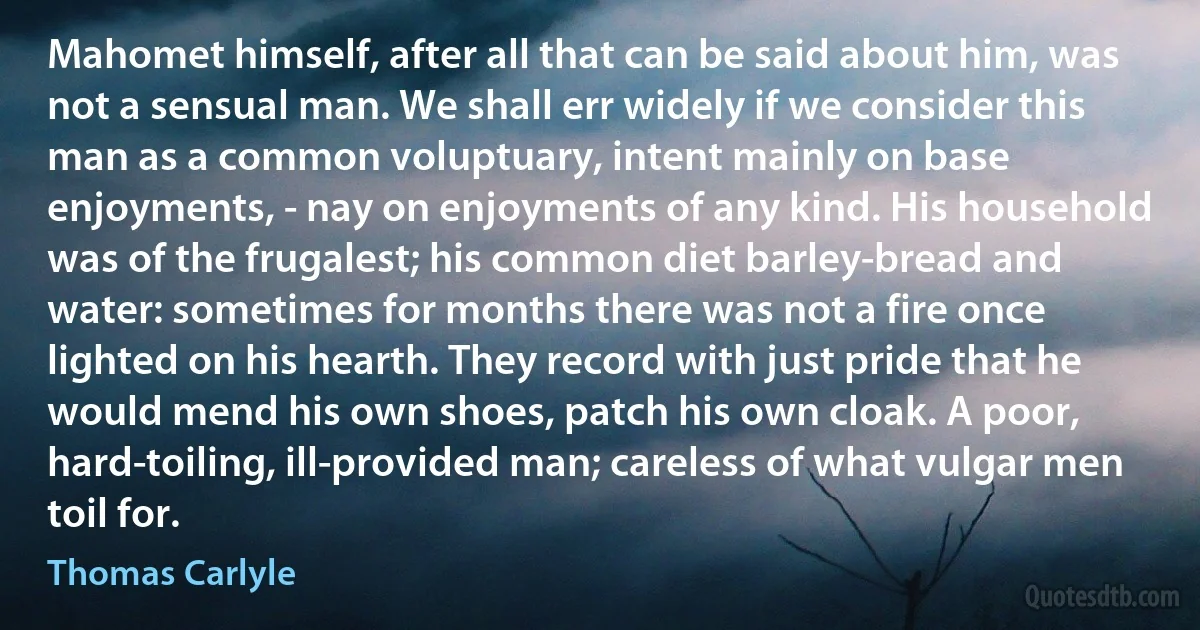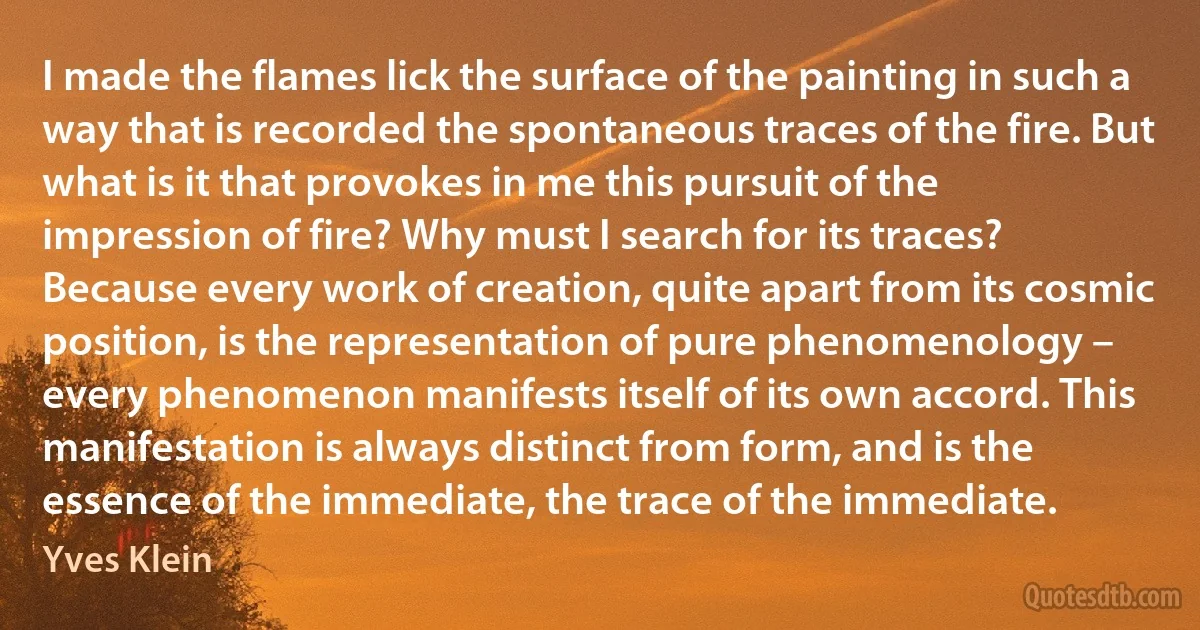Fire Quotes - page 24
We call that fire of the black thunder-cloud "electricity," and lecture learnedly about it, and grind the like of it out of glass and silk: but what is it? What made it? Whence comes it? Whither goes it? Science has done much for us; but it is a poor science that would hide from us the great deep sacred infinitude of Nescience, whither we can never penetrate, on which all science swims as a mere superficial film. This world, after all our science and sciences, is still a miracle; wonderful, inscrutable, magical and more, to whosoever will think of it.

Thomas Carlyle
In that strange island Iceland,-burst up, the geologists say, by fire from the bottom of the sea; a wild land of barrenness and lava; swallowed many months of every year in black tempests, yet with a wild gleaming beauty in summertime; towering up there, stern and grim, in the North Ocean with its snow jokuls, roaring geysers, sulphur-pools and horrid volcanic chasms, like the waste chaotic battle-field of Frost and Fire;-where of all places we least looked for Literature or written memorials, the record of these things was written down.

Thomas Carlyle
To the wild deep-hearted man all was yet new, not veiled under names or formulas; it stood naked, flashing in on him there, beautiful, awful, unspeakable. Nature was to this man, what to the Thinker and Prophet it forever is, preternatural. This green flowery rock-built earth, the trees, the mountains, rivers, many-sounding seas;-that great deep sea of azure that swims overhead; the winds sweeping through it; the black cloud fashioning itself together, now pouring out fire, now hail and rain.

Thomas Carlyle
Consider how, even in the meanest sorts of Labour, the whole soul of a man is composed into a kind of real harmony, the instant he sets himself to work! Doubt, Desire, Sorrow, Remorse, Indignation, Despair itself, all these like helldogs lie beleaguering the soul of the poor dayworker, as of every man: but he bends himself with free valour against his task, and all these are stilled, all these shrink murmuring far off into their caves. The man is now a man. The blessed glow of Labour in him, is it not as purifying fire, wherein all poison is burnt up, and of sour smoke itself there is made bright blessed flame!

Thomas Carlyle
In the ages to come man may be able to predict, perhaps even to control, the wayward courses of the winds and the clouds, but hardly will his puny hands have strength to speed afresh our slackening planet in its orbit or rekindle the dying fire of the sun. Yet the philosopher who trembles at the idea of such distant catastrophes may console himself by reflecting that these gloomy apprehensions, like the earth and the sun themselves, are only parts of that unsubstantial world which thought has conjured up out of the void, and that the phantoms which the subtle enchantress has evoked to-day she may ban to-morrow. They too, like so much that to the common eye seems solid, may melt into air, into thin air.

James Frazer
The Laws of Nature are just, but terrible. There is no weak mercy in them. Cause and consequence are inseparable and inevitable. The elements have no forbearance. The fire burns, the water drowns, the air consumes, the earth buries. And perhaps it would be well for our race if the punishment of crimes against the Laws of Man were as inevitable as the punishment of crimes against the Laws of Nature --were Man as unerring in his judgments as Nature.

Henry Wadsworth Longfellow
If Soviet Union were to fire over this zone with nuclear weapons directed at France, or if, conversely, the Americans or the French were to fire over this territory with nuclear weapons towards Russia, the resulting radioactive clouds would be driven into this territory by the west winds from the one side, and the east winds from the other, and the Soviet Union could certainly not request the winds to keep to a specific path.

Anastas Mikoyan
For with what eyes of the mind was your Plato able to see that workhouse of such stupendous toil, in which he makes the world to be modelled and built by God? What materials, what bars, what machines, what servants, were employed in so vast a work? How could the air, fire, water, and earth, pay obedience and submit to the will of the architect? From whence arose those five forms, of which the rest were composed, so aptly contributing to frame the mind and produce the senses? It is tedious to go through all, as they are of such a sort that they look more like things to be desired than to be discovered.

Cicero
At present, I am particularly excited by 'bad taste'. I have the deep feeling that there exists in the very essence of bad taste a power capable of creating those things situated far beyond what is traditionally termed 'The Work of Art'. I wish to play with human feeling, with its 'morbidity' in a cold and ferocious manner. Only very recently I have become a sort of gravedigger of art (oddly enough, I am using the very terms of my enemies). Some of my latest works have been coffins and tombs. During the same time I succeeded in painting with fire, using particularly powerful and searing gas flames, some of them measuring three to four meters high. I use these to bathe the surface of the painting in such a way that it registered the spontaneous trace of fire.

Yves Klein
The present life of man, O king, seems to me, in comparison of that time which is unknown to us, like to the swift flight of a sparrow through the room wherein you sit at supper in winter, with your commanders and ministers, and a good fire in the midst, whilst the storms of rain and snow prevail abroad; the sparrow, I say, flying in at one door, and immediately out at another, whilst he is within, is safe from the wintry storm; but after a short space of fair weather, he immediately vanishes out of your sight, into the dark winter from which he had emerged. So this life of man appears for a short space, but of what went before, or what is to follow, we are utterly ignorant. If, therefore, this new doctrine contains something more certain, it seems justly to deserve to be followed.

Bede
Air, fire, water and the earth evolve out of the spiritual and material staminibus in periodic cycles of time. Diverse connections of water, air, and light precede the emergence of the seed of the simplest plant, for instance moss. Many plants had to come into being, then die away before an animal emerged. Insects, birds, water animals, and night animals preceded the present animal forms; until finally the crown of earthly organization appeared-the human being, microcosm. He is the son of all the elements and beings, Nature's most carefully chosen conception and the blossom of creation. He must be the youngest child of Nature; many evolutions and revolutions must have preceded his formation.

Johann Gottfried Herder



